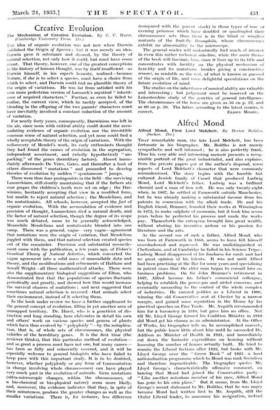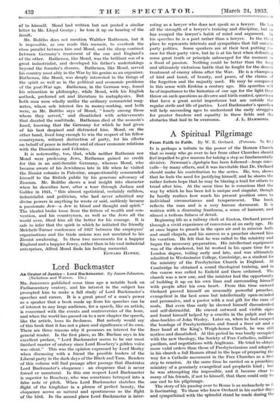Alfred Mond
Alfred Mond, First Lord Melchett. By Hector Bolitlio. (Seeker. 21e.) THAT remarkable man, the • late Lord Melehett, has been fortunate in his biographer. Mr. Bolitho is not merely sympathetic and well informed ; he is also perfectly frank-. Thus his very able and interesting memoir presents a recog- nizable portrait of the great industrialist, and also explains, from the private papers put at the author's disposal, some aspects of Lord Melchett's character that were commonly misunderstood. The story begins with the humble but cultured Jewish family of Cassel that produced Ludwig Mond, Lord Melehett's father. Ludwig was a brilliant chemist and a man of iron will. He was only twenty-eight. when, in 1867, he settled at Farnworth outside Manchester, but he was already making a substantial income from his patents in connexion with the alkali trade. He and his English friend, Brunner, founded their works at Winnington in 1873, to make sulphate of ammonia, but it took him seven years before he perfected his process and made the works pay. Thenceforth the enterprise brought him great wealth, without abating his inventive ardour or his passion for literature and the arts.
As the second son of such a father, Alfred Mond, who was born at Farnworth in 1868, seems to have felt himself overshadowed and repressed. He was undistinguished at Cheltenham, and at Cambridge he failed in his Science Tripos. Ludwig Mond disapproved of his fondness for cards and had no great opinion of his talents. It was not until Alfred had been practising at the Bar for some years and specializing in patent cases that the elder man began to consult him on business problems. On Sir John Brunner's retirement in 1897, Alfred became his father's commercial colleague, helping to establish the power-gas and nickel concerns, and eventually succeeding to the control of the whole complex of industries. He entered politics as a Liberal in 1906, winning the old Conservative seat at Chester by a narrow margin, and gained some reputation in the House by his practical speeches on Free Trade. Mr. Asquith recommended him for a baronetcy in 1910, but gave him no office. Not till Mr. Lloyd George formed his Coalition Ministry in 1916 did Mond get his chance as an administrator. At the Office of Works, his biographer tells us, he accomplished marvels, but the public knew little about him until he succeeded Dr. Addison as Minister of Health in 1921, and immediately cut down the fantastic expenditure on housing without lessening the number of houses actually built. He tried to reunite the Liberal factions after 1922, but broke with Mr. Lloyd George over the "Green Book" of 1925—a land nationalization programme which to Mond was rank Socialism and therefore impracticable. The biographer quotes Mr. Lloyd George's characteristically offensive comment, on hearing that Mond had joined the Conservative party- " Like another notorious member of his race, Alfred Mond has gone to his own place." But it seems, from Mr. Lloyd George's recent statement to Mr. Bolitho, that he was angry because Mond had written first to Mr. Asquith, still the titular Liberal leader, to announce his resignation, instead
of to himself. Mond had written but not posted a similar letter to Mr. Lloyd George ; he tore it up on hearing of the insult.
Mr. Bolitho does not mention Walther Rathenau, but it Is impossible, as one reads this memoir, to overlook the close parallel between him and Mond, and the sharp contrast between Germany's treatment of the one and England's of the other. Rathenau, like Mond, was the brilliant son of a great industrialist, and developed his father's undertakings beyond the founder's dreams. Rathenau, like Mond, served his country most ably in the War by his genius as an organizer. Rathenau, like Mond, was deeply interested in the things of the spirit as well as in the political and economic problems of the post-War age. Rathenau, in the German way, found his relaxation in philosophy, while Mond, with his English outlook, preferred art and literature to metaphysics. But both men were wholly unlike the ordinary commercial mag- nates, wludse sole interest lies in money-making, and both were, as Mr. Bolitho says of Mond, "lonely among those whom they served," and dissatisfied with achievements that dazzled the multitude. Rathenau died at the assassin's hand, knowing that the Germany for which he had given of his best despised and distrusted him. Mond, on the other hand, lived long enough to win the respect of his fellow countrymen, without distinction of party, for his efforts on behalf of peace in industry and of closer economic relations with the Dominions and Colonies.
It is noteworthy, too, that, while neither Rathenau nor Mond were professing Jews, Rathenau gained no credit for this in an anti-Semitic Germany, whereas Mond, who became aware of his Jewishness late in life when he visited the Zionist colonies in Palestine, unquestionably commended himself to the British public by his generous advocacy of Zionism. Mr. Bolitho shows a real insight into character when he describes how, after a tour through Judaea and Galilee in 1921, "this almost egotistical, certainly ruthless, industrialist and politician, who had never admitted any divine powers in anything he wrote or said, suddenly became a passionate Jew—a Jew in blood and thought and spirit." The idealist broke loose from the fetters of wealth and con- vention, and his countrymen, as well as the Jews all the world over, liked him all the better for his courage. It is safe to infer that the spirit in which he initiated the friendly Melchett-Turner conference of 1927 between the employers' organisations and the trade unions was not unrelated to his Zionist awakening. In these two movements for a happier England and a happier Jewry, rather than in his vast industrial enterprises, Alfred Mond finds his lasting memorial.
EDWARD HAWKE.







































 Previous page
Previous page